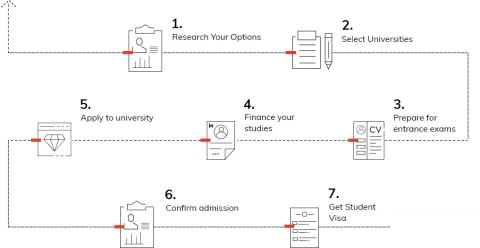-
Affordable Education
-
Innovative and Abundant Research Opportunities
-
Immigration Possibilities
-
Exciting Campus Lifestyle
-
Healthy and Safe Communities
-
International students can often work while they study & Internships
-
Numerous research opportunities
-
Possibility of immigration after completing the course
-
Vibrant campus atmosphere
-
International students have the option of working when studying
-
Good internship opportunities
Educational Qualification
- The minimum eligibility criteria to graduate is you have to score at least 50% from a UGC or AICTE recognized university.
Year Back
- The graduation degree has to be completed within the stipulated time with no gap year.
- Example: B.Com is a 3-year degree. The client should have completed it within 3 years and not more.
- Example: Engineering is a 4-year degree. The client should have completed within 4 years and not more.
You will generally need the following for your Germany Student Visa application
Average Tuition Fees in €
€6,500 -€26,000 yearly
€1,000 – €40,000 yearly
Summer Semester – The summer semester is between March to August.
Winter Semester –September to February or October to March.
Student Applicant
-
Students must be over 18 years of age.
-
International students in Germany universities can work on-campus or off-campus for up to 20 hours during university semesters and full-time during breaks such as the winter or summer holidays, without the need for a work permit.
-
Foreign students who are studying in a program that requires work experience such as through a co-op or internship program.
Spouse
-
In general, spouses are given the same rights as students who are already in Germany. Therefore, if the student with a Germany student visa has the right to work, the spouse who comes to join him or her will also have that right
UNIVERSITY NAMES
Technische Universität München
Ludwig-Maximilians-Universität München
Ruprecht-Karls-Universität Heidelberg
Humboldt-Universität zu Berlin
Freie Universität Berlin
KIT, Karlsruher Institut für Technologie
Rheinisch-Westfälische Technische Hochschule Aachen
Technische Universität Berlin
Technische Universität Dresden
Eberhard Karls Universität Tübingen
Universität Freiburg


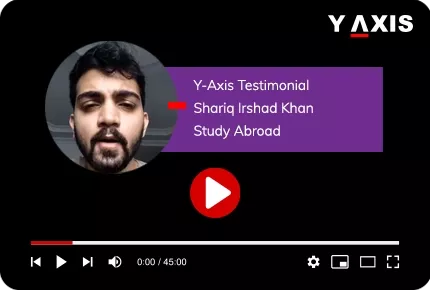
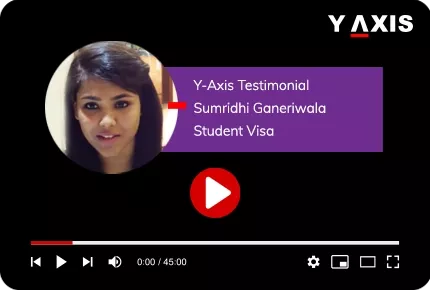
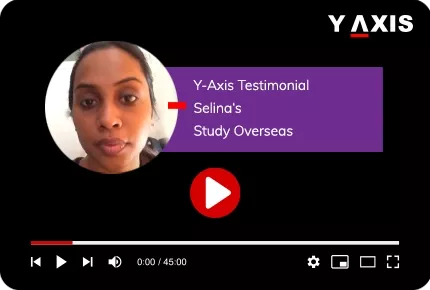
Study in Germany 2025, Student Visa 2025, Top universities to study in Germany 2025, Germany Student Visa
Study in Germany from UAE with Y-Axis. Learn about student visa process, top universities, costs, scholarships, English-taught courses & post-study work options.
Study in Germany from the UAE – Your Complete Guide
Germany is a popular choice for students in Europe, especially those from the UAE. It has good universities, low tuition, and job prospects, making it a great place to study abroad.
- More than 469,000 international students are in German universities.
- International student numbers went up by 7% last year.
- Most public universities do not charge tuition.
- Students from outside the EU are allowed to work up to 20 hours a week.
- Graduates can stay for a year and a half to look for employment.
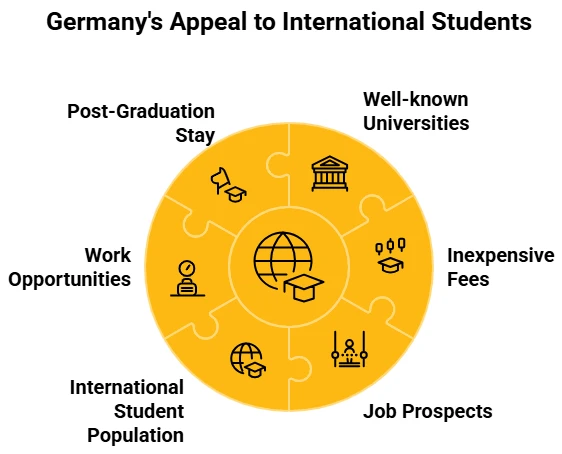
*Want guidance to apply for Study in Germany? Sign up with Y-Axis for comprehensive support with the process.
Why Study in Germany from the UAE?
Germany attracts many students from the UAE because of its good education and low tuition. It's known for being very strong in subjects like engineering, business, and science. Students there can use advanced research tools, modern buildings, and learn from great teachers. Most government-run schools don't cost much, making it a good choice for students from the UAE who want to save money.
Also, Germany is safe and friendly, with cities that have people from all over the world and good transportation. The country’s visa rules let students work while they study and look for jobs after they graduate. This makes it easier for them to build their careers and live there for a long time.
*Looking to study overseas? Y-Axis is here to guide you with the process.
What is Germany Student Visa?
The Germany Student Visa, a national visa (Type D), enables students from outside the EU, such as those from the UAE, to enter and reside in Germany for full-time academic study. It is for students accepted to a German higher education institution.
This visa allows a stay of over 90 days, participation in a program, and the option to change the visa to a residence permit upon arrival. It also permits part-time work during studies and the chance to apply for an 18-month work extension after graduation.
Types of Germany Student Visas
The various types of German Student Visa are given in the table below.
|
Visa Type |
Purpose |
Duration |
|
Student Visa |
For students with confirmed admission to a German university |
Up to 90 days (extendable) |
|
Student Applicant Visa |
For students applying in person or awaiting final admission |
Up to 90 days (extendable) |
|
Language Course Visa |
For those enrolled in an intensive German language course |
Duration of the course (max 1 year) |
Benefits of Studying in Germany
Germany provides several appealing choices for students. Many public schools do not charge tuition, even for students from other countries.
- German schools have a good reputation around the world.
- There are many programs taught in English at both the bachelor's and master's levels.
- After graduation, students can stay for a year and a half to look for work in their field.
- Germany's job market is strong, especially in areas like engineering, IT, and healthcare.
- Students can work up to 20 hours each week during the school year and full-time during breaks.
- Germany is safe and has good transportation, healthcare, and a high quality of life.
- A student visa allows travel to 26 countries in Europe.
- The cost of living in Germany is fairly low compared to many other countries in Western Europe.
- After gaining work experience, students can apply to become permanent residents.
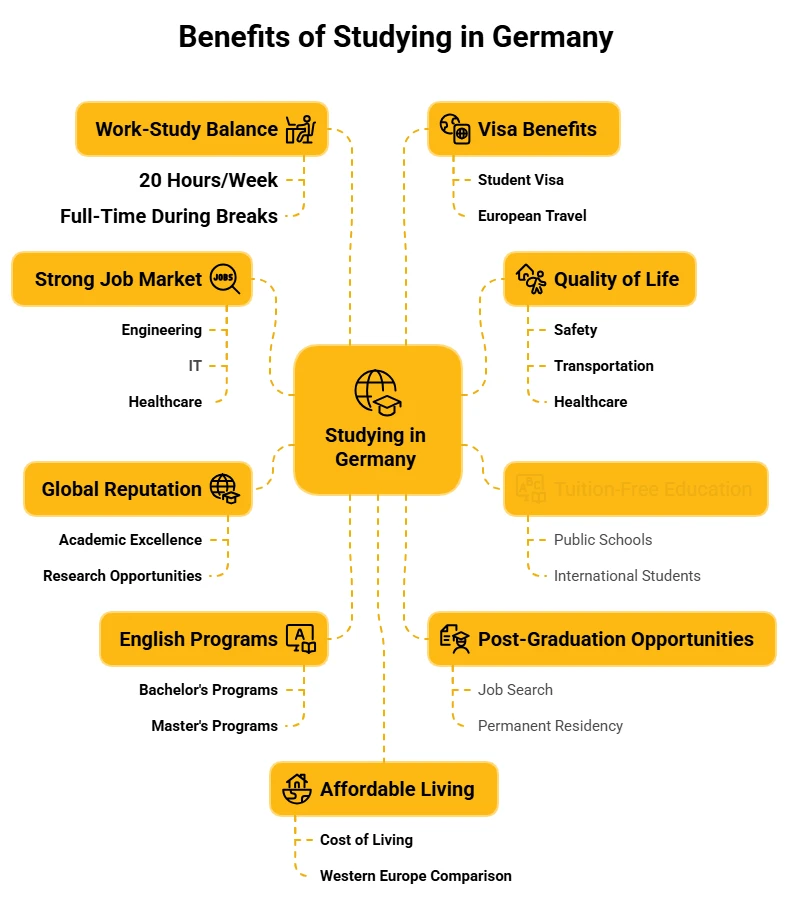
Who Can Apply for a Germany Student Visa from the UAE?
To apply, individuals must meet the following criteria:
- Be a UAE National admitted to an accredited German higher education institution.
- Be a UAE resident (expatriate) holding a valid UAE residency visa and a non-EU passport.
- Have been fully or conditionally admitted to a German university.
- Be applying for a language course, preparatory program or a student applicant visa.
- Be able to give proof of sufficient funds, health insurance, academic credentials, and language skills.
- Have clear intention to enroll as a full-time student and meet German immigration and academic standards.
Eligibility Criteria for Studying in Germany
To be eligible to study in Germany, you meet the eligibility criteria given below.
- To enroll in a bachelor’s program, applicants must possess a high school diploma. Admission to a master’s program generally needs a bachelor’s degree.
- A letter of acceptance, even if conditional, from a German educational institution is necessary.
- Proficiency in the language of instruction is required, as shown by official scores from tests such as IELTS or TOEFL for English programs, or TestDaF or DSH for German programs, matching the program’s requirements.
- Sufficient financial resources are needed to cover living expenses, often around €11,904 in a blocked account for one year.
- A current passport and a clean criminal record are requirements.
- Applicants should secure health insurance valid in Germany.
- Educational records and any requested documents should be prepared.
- Enrollment should be on a full-time basis, and adherence to all visa regulations is expected.
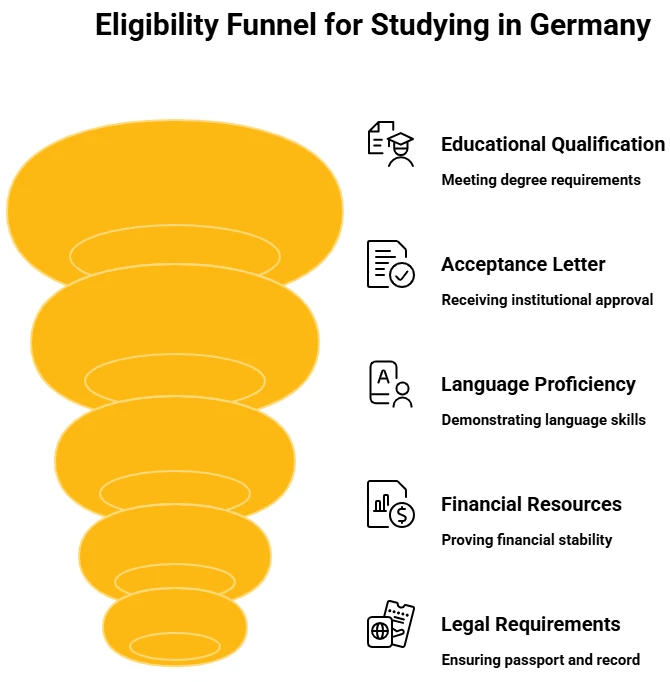
Documents Required to Study in Germany from the UAE
To apply for a German national visa, you will generally need:
- A passport valid for at least six more months, with blank pages for visa stamps.
- A completed national visa application form (Type D).
- Recent passport-sized photos that meet the German embassy's requirements.
- A letter of admission (or conditional acceptance) from a German university.
- Official academic records (high school or Bachelor's).
- Proof you can support yourself financially—often a blocked account with around €11,904 for a year.
- Proof of health insurance that works in Germany.
- A language certificate (like IELTS, TOEFL, or TestDaF).
- A statement of purpose describing your study plans and career aims.
- A CV showing your education and work history.
- A receipt confirming you've paid the visa fee.
- Proof of where you will be staying.
- A police clearance certificate, if the embassy asks for one.
How to Apply for a Germany Student Visa – Step-by-Step
The process to apply for a Germany Student Visa is given below.
Step 1: Get an acceptance letter (either regular or conditional) from a German university or school that is approved.
Step 2: Create a special bank account with a minimum of €11,904 to cover your expenses. Also, get health insurance that will last for as long as you plan to stay in Germany.
Step 3: Make an appointment at the German Embassy or Consulate in the UAE to turn in your visa application.
Step 4: Submit all the papers they ask for, give your fingerprints and photo, pay the visa fee, and go to the visa interview if they require one.
Step 5: If it gets approved, pick up your visa and get ready to go to Germany.
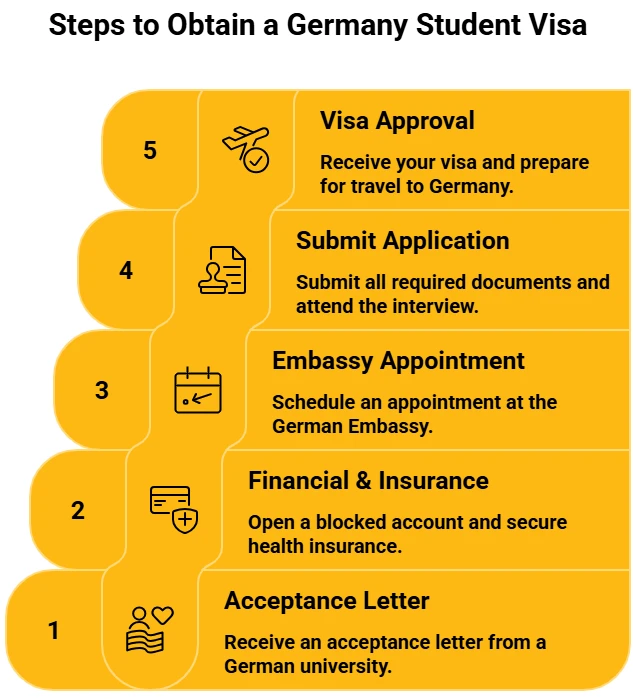
Cost of Studying in Germany from the UAE
Detailed information about the cost of studying in Germany is given below:
|
Expense Category |
Estimated Cost (EUR) |
|
Tuition Fees (Public Univ.) |
€0 – €1,500 per year |
|
Semester Contribution |
€250 – €350 per semester |
|
Private University Tuition |
€10,000 – €20,000 per year |
|
Living Expenses |
€900 – €1,200 per month |
|
Blocked Account Requirement |
€11,904 per year |
|
Health Insurance |
€90 – €120 per month |
|
Visa Application Fee |
€ 75 |
|
Flight & Travel Costs |
€500 – €800 (one-way) |
|
Initial Setup (Deposit, Essentials) |
€800 – €1,000 |
Germany Student Visa Processing Time
Detailed information about the processing time for Germany Student Visa is given below.
|
Stage of Process |
Estimated Time Frame |
|
Visa Appointment Availability |
1 to 4 weeks |
|
Document Submission & Biometric |
1 day (on appointment date) |
|
Visa Processing Duration |
4 to 12 weeks |
|
Total Estimated Timeline |
5 to 13 weeks |
Scholarships for UAE Students to Study in Germany
The various scholarships available for UAE students in Germany are given below.
|
Scholarship Name |
Amount |
What It Covers |
|
DAAD Scholarship (PG Programs) |
€850–€1,200/month |
Tuition (where applicable), living expenses, travel allowance, insurance |
|
Deutschlandstipendium |
€300/month |
Merit-based grant for living costs; jointly funded by public & private sectors |
|
Erasmus+ |
€300–€600/month + tuition |
Tuition, living expenses, travel grants for exchange & joint master’s degrees |
|
Konrad-Adenauer-Stiftung (KAS) |
€850/month + travel costs |
Monthly stipend, insurance, travel allowance, German language courses |
|
Friedrich Ebert Stiftung |
€750–€850/month |
Living expenses, health insurance, books, language support |
|
Heinrich Böll Foundation |
Up to €1,200/month |
Full academic funding, tuition fees (if any), health insurance |
|
Rosa Luxemburg Foundation |
€850/month + allowances |
Living costs, health insurance, and travel for international students |
|
KAAD Scholarship |
Varies |
For postgraduate students; covers living, travel, tuition, and language prep |
|
Humboldt Research Fellowship |
€2,670/month (postdocs) |
Living, travel, and research expenses for PhD and postdoc researchers |
|
BayHOST Scholarship |
€850/month |
For students from Central/Eastern Europe & MENA; living and tuition support |
Can You Work While Studying in Germany?
Yes, international students can work while studying in Germany. Students can work up to 120 full days or 240 half days each year without needing a separate permit. During the semester, students can work part-time for up to 20 hours a week. Full-time work is allowed during semester breaks and official holidays.
Some university jobs, such as working as a research assistant, might not count toward these limits. While part-time work can help students with living costs and provide work experience, it shouldn't be viewed as the primary source of income, as students still need to prove they have sufficient funds for their visa. Working more hours than allowed or without the proper authorization can cause issues with their visa status.
Post-Study Work and PR Opportunities in Germany
International graduates can apply for an 18-month residence permit in order to seek employment that aligns with their academic background. Upon securing such employment, they have the option to switch to a work visa or an EU Blue Card. After a certain period of legal employment, students may then be able to apply for permanent residency.
More information is given below:
|
Option |
Details |
Duration / Conditions |
|
Job Seeker Visa (Post-Study) |
Allows graduates to stay in Germany to find a job related to their field of study |
Valid for up to 18 months after graduation |
|
EU Blue Card |
Work and residence permit for highly skilled professionals with a job offer |
Minimum salary threshold applies; valid for up to 4 years |
|
Permanent Residency (PR) |
Allows long-term stay and freedom to live and work in Germany indefinitely |
Eligible after 33 months on Blue Card or 21 months with B1 German level |
|
Settlement Permit |
A type of PR for skilled workers who have held a residence permit for several years |
Requires stable income, German integration, and insurance |
|
Path to German Citizenship |
Citizenship through naturalization after living in Germany with legal residence |
Eligible after 5 to 8 years (depends on integration level) |
Bringing Family While Studying in Germany
In Germany, international students can bring their immediate family—spouses and children—if they meet certain criteria. Students need to prove they have enough money, housing, and health insurance for each family member. A separate family reunion visa is required, and it’s usually processed after the student gets their visa and residence permit.
Student spouses usually cannot work without special permission. Children can go to public schools for free. Family members get residence permits that last as long as the student’s stay. Bringing family is possible but requires careful planning and paperwork.
Top Courses to Study in Germany
|
Field of Study |
Top Universities / Schools |
Popular Programs |
|
Engineering |
- TU Munich - RWTH Aachen University - TU Berlin - Karlsruhe Institute of Technology - TU Dresden - University of Stuttgart - Leibniz University Hannover - TU Darmstadt - University of Freiburg - University of Erlangen-Nuremberg |
Mechanical, Electrical, Civil, Automotive, Mechatronics |
|
Computer Science & IT |
- TU Munich - University of Bonn - University of Mannheim - RWTH Aachen University - Saarland University - TU Darmstadt - LMU Munich - University of Potsdam - KIT - University of Bremen |
Data Science, AI, Cybersecurity, Software Engineering |
|
Business & Management |
- University of Mannheim - WHU - Frankfurt School of Finance - ESMT Berlin - LMU Munich - TU Munich - University of Cologne - HHL Leipzig - University of Hamburg - EBS University |
International Business, Finance, MBA, Marketing |
|
Medicine & Health Sciences |
- Heidelberg University - Charité – Universitätsmedizin Berlin - LMU Munich - University of Freiburg - University of Tübingen - RWTH Aachen - University of Göttingen - University of Leipzig - University of Ulm - University of Würzburg |
General Medicine, Public Health, Dentistry, Biomedical |
|
Natural Sciences |
- LMU Munich - Heidelberg University - University of Göttingen - University of Freiburg - University of Würzburg - RWTH Aachen - University of Tübingen - University of Kiel - TU Dresden - University of Bonn |
Physics, Chemistry, Biology, Earth Sciences |
|
Law |
- Heidelberg University - LMU Munich - University of Freiburg - University of Cologne - Humboldt University Berlin - University of Hamburg - Goethe University Frankfurt - University of Münster - University of Leipzig - University of Bonn |
German Law, International Law, European Law |
|
Architecture & Design |
- TU Berlin - University of Stuttgart - Bauhaus University Weimar - RWTH Aachen - TU Dresden - University of Kassel - HCU Hamburg - TU Munich - Leibniz University Hannover - KIT |
Architecture, Urban Planning, Landscape Architecture |
|
Social Sciences & Humanities |
- Humboldt University Berlin - LMU Munich - University of Heidelberg - University of Leipzig - University of Bielefeld - University of Konstanz - University of Cologne - University of Münster - Free University Berlin - University of Jena |
Sociology, Psychology, Political Science, History |
|
Environmental Science |
- University of Freiburg - TU Munich - University of Bayreuth - University of Göttingen - University of Kiel - University of Hohenheim - RWTH Aachen - University of Greifswald - TU Dresden - University of Potsdam |
Sustainability, Environmental Mgmt, Climate Studies |
|
Arts & Music |
- Berlin University of the Arts - Hochschule für Musik und Theater München - Folkwang University of the Arts - Hochschule für Musik Hanns Eisler Berlin - University of Music Stuttgart - University of Music Karlsruhe - Music Würzburg - Arts Bremen - Leipzig University of Music - HfMT Hamburg |
Fine Arts, Music, Performance, Digital Arts, Musicology |
Top Universities in Germany for UAE Students
|
University Name |
QS World Ranking 2025 |
Why It's Popular Among UAE Students |
|
Technical University of Munich (TUM) |
#28 |
Renowned for engineering, IT, and business; offers many English-taught programs |
|
Ludwig Maximilian University of Munich |
#54 |
Strong in medicine, humanities, and sciences with global research reputation |
|
Heidelberg University |
#63 |
Germany’s oldest university, known for medicine and life sciences |
|
Humboldt University of Berlin |
#87 |
Popular for social sciences, law, and humanities in the capital city |
|
Free University of Berlin |
#98 |
Known for political science, international relations, and interdisciplinary studies |
|
RWTH Aachen University |
#106 |
Leading technical university; popular for mechanical and civil engineering |
|
Karlsruhe Institute of Technology (KIT) |
#118 |
High research output in computer science, engineering, and natural sciences |
|
University of Freiburg |
#129 |
Excellent for life sciences and environmental studies |
|
University of Göttingen |
#139 |
Reputable for natural sciences, especially biology and physics |
|
University of Tübingen |
#147 |
Strong in medicine, humanities, and AI research |
Living in Germany as a Student
For students, living in Germany is generally affordable and safe. Monthly costs usually range from €850 to €1,100, varying by city. Students often pay little to no tuition at public universities, and they get discounts on public transportation, cheaper meals, and affordable health insurance. International students can find a good quality of life whether they choose a lively city such as Berlin or a calmer one like Freiburg. They can also work part-time and be part of a multicultural setting that helps them succeed in school and grow as people.
How Y-Axis Can Help You?
Y-Axis, a leading immigration and visa consultancy in the UAE, We aid students in applying to German universities by giving expert advice during each stage. With our experience and global reach, Y-Axis makes sure students have a simple and well-informed study-abroad experience that fits their aims.
Our services include:
- Individualized advice on picking universities and courses in Germany.
- Expert help with student visa paperwork and applications.
- Avail Y-Axis Coaching services for better results in tests.
- Support with SOPs, LORs, and admission interviews.
- Continued support with services after arrival and advice on housing.

